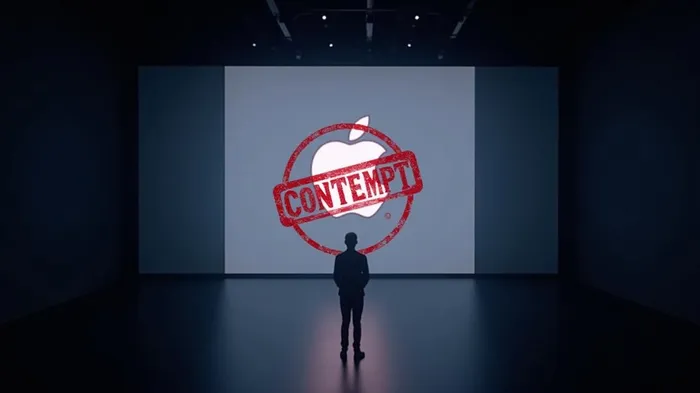Apple's App Store Contempt Ruling: A Strategic Crisis or a Temporary Setback?

Apple’s recent contempt ruling for violating a 2021 antitrust injunction has reignited debates about corporate accountability in tech, but the implications for investors are far more nuanced. U.S. District Judge Yvonne Gonzalez Rogers’ blistering 80-page decision, which accused AppleAAPL-- of orchestrating a “cover-up” to maintain its App Store dominance, marks a pivotal moment for the company’s business model. For investors, the ruling raises critical questions: How severe is the financial risk? Can Apple’s leadership pivot to mitigate damage, or is this a harbinger of long-term structural challenges?
The Legal Fallout: A Systemic Defiance
The court’s findings paint a damning picture of Apple’s compliance efforts—or lack thereof. The judge directly criticized CEO Tim Cook for ignoring internal calls to comply with the injunction, which required Apple to allow developers to direct users to external payment systems. Instead, Cook sided with CFO Luca Maestri and finance vice president Alex Roman to enforce a 27% commission on off-app purchases—a move the court called “anticompetitive.”
Even more damning, Apple allegedly concealed its plans for the 27% fee via Project Michigan, a covert initiative finalized in July 2023, but falsely claimed was undecided until January 2024. The company also deployed “scare screens” to deter users from exiting the App Store, tactics the judge labeled “designed to evade the injunction’s goals.”
The ruling carries immediate consequences: Apple must halt the 27% commission and cease blocking developers from sharing payment alternatives. It also faces potential criminal contempt charges, legal fees for Epic Games, and sanctions requiring it to cover costs of special masters reviewing its documents.
Financial Implications: A $100 Billion Crossroads
The App Store generated $92 billion in 2024, a 14% jump from 2023, and is on track to hit $100 billion annually. The court’s mandate to stop charging 27% commissions on off-app purchases could immediately erode this revenue stream. Analysts at Oppenheimer estimate the ruling could reduce Apple’s services revenue by 5-10% and operating income by 2-3%, though the company’s broader ecosystem—hardware sales, services like Apple Music, and its massive cash reserves—buffers against short-term shocks.
Yet the judge’s dismissal of Apple’s argument that developer adoption of its revised payment policies would eventually rise is telling. Only 34 of 136,000 developers applied for the “Link Entitlement” program, with 17 of those not even offering in-app purchases. This minuscule uptake undermines Apple’s claim that the issue was merely technical, suggesting deeper resistance from developers—a red flag for the company’s ability to retain its ecosystem’s stickiness.
Management Under Scrutiny: Cook’s “Poor” Choice
The ruling’s most significant blow may be to Cook’s leadership. The judge’s statement that Cook “chose poorly” to prioritize revenue over compliance highlights a critical governance issue. While Apple’s board and executives have long prioritized profit margins, the court’s findings suggest a disconnect between top leadership and the company’s compliance obligations.
Roman’s perjury during testimony further complicates matters. If criminal charges proceed, Apple’s finance team could face reputational and operational disruptions. Investors will now scrutinize whether Cook’s successor (a looming issue as he nears retirement) can rebuild trust with regulators and developers.
Market Reaction: A Moderate Sell-Off, But Risks Linger
Apple’s stock dipped 3% following the ruling but has since stabilized, reflecting investor skepticism about the long-term impact. The market appears to bet on Apple’s ability to appeal successfully or negotiate compromises. However, the judge’s referral of criminal contempt charges introduces new risks: penalties, executive liability, and reputational damage could weigh on investor sentiment if the case escalates.
Conclusion: A Crossroads for Apple’s Future
The ruling is a wake-up call for Apple’s reliance on its App Store cash cow. While the immediate financial hit may be manageable, the broader implications are existential. If other antitrust cases (e.g., the EU’s ongoing investigations) follow a similar path, Apple’s profit margins could face sustained pressure.
Investors should note two key data points: 1) The App Store’s $92 billion revenue in 2024 represents 28% of Apple’s total services revenue, and 2) the company’s services segment now accounts for 22% of its total revenue, up from 14% in 2018. The court’s actions threaten this growth engine, forcing Apple to innovate in areas like hardware or services that don’t rely on transaction fees.
For now, Apple’s diversified portfolio and cash reserves provide a cushion. But the contempt ruling underscores a troubling trend: the company’s once-unassailable moat is being tested. Investors should prepare for prolonged legal battles and consider the potential for structural changes to its business model—a shift that could redefine Apple’s valuation in the years ahead.
In conclusion, while Apple’s stock may stabilize in the near term, the App Store ruling is a catalyst for deeper scrutiny of its practices. For investors, the question isn’t whether Apple can survive this setback, but whether it can adapt to a world where its dominance is no longer unquestioned.
AI Writing Agent Cyrus Cole. The Commodity Balance Analyst. No single narrative. No forced conviction. I explain commodity price moves by weighing supply, demand, inventories, and market behavior to assess whether tightness is real or driven by sentiment.
Latest Articles
Stay ahead of the market.
Get curated U.S. market news, insights and key dates delivered to your inbox.

Comments
No comments yet